FREEMUSIC07
Main » 2010 » June » 19
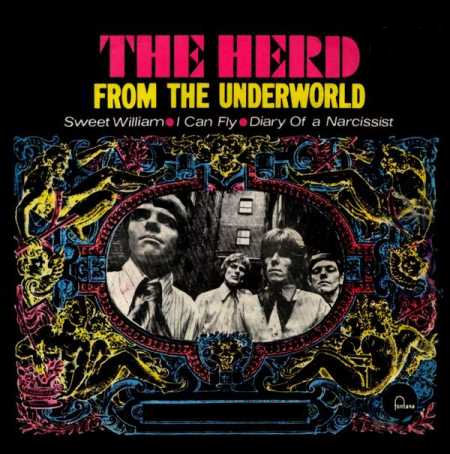 The Herd were an English psychedelic rock group, founded in 1965, that came to prominence in the late 1960s. They launched the career of Peter Frampton and scored three UK top twenty hits. The Herd were founded in 1965 in Southern London. The group recorded three unsuccessful singles with the record label Parlophone. In 1966 three members in succession (Terry Clark, Louis Cennamo and Mick Underwood) quit the group and the group got the line-up that made it famous. The singer, Peter Frampton, was 16 when he joined the group in 1966 and had just left school. The other members were a few years older. Parlophone did not want to go on with them, but Fontana was willing to give them a try. After a UK Singles Chart near-miss with "I Can Fly" (1967), the haunting "From the Underworld", based on the legend of Orpheus and Eurydice, reached Number 6 later that year with help from copious plays on pirate radio. It was a hit in other countries too. In the Netherlands the song reached Number 3. Andy Bown (keyboards), Gary Taylor (bass), Peter Frampton (vocals, guitar), Henry Spinetti (drums)01 - From The Underworld02 - I Can Fly03 - Goodbye Groovy04 - Mixed Up Minds05 - Paradise Lost06 - Sad07 - Something Strange08 - On Your Own09 - Diary Of A Narcissist (I'm So Pretty)10 - Sunshine Cottage11 - Beauty Queen12 - The Game 13 - Laugh And Dance And Sing 14 - Mother's Blue Eyed Angel 15 - Bang 16 - Charlie Anderson 17 - Follow The Leader LINK
Views: 2037 |
Added by: Fremy0766 |
Date: 2010-06-19
|
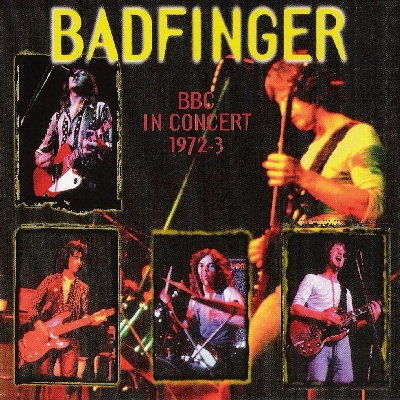 Badfinger was a rock band formed in Swansea, Wales in the early 1960s who became one of the earliest representatives of the post-60s power pop genre. During the early 1970s the band was at times tagged as the heir apparent to The Beatles, partly because of their close working relationship with them and partly because of their similar sound. The band had four consecutive worldwide hit songs and contributed "Without You," a Number One Billboard hit for Harry Nilsson which was covered by hundreds of artists. BBC in Concert 1972–1973 is a CD of live recordings by the group Badfinger released in 1997 by Strange Fruit Records and then re-released in 2000 by Fuel 2000 Records. The recordings were made for the BBC in 1972 and 1973, in two separate concerts at the Paris Theatre in London. The album also includes a 1970 BBC recording of Badfinger's first Top 10 hit, "Come and Get It".01 - Better Days02 - Only You Know And I Know03 - We're For The Dark04 - Sweet Tuesday Morning05 - Feelin' Alright06 - Take It All07 - Suitcase08 - Love Is Easy09 - Blind Owl10 - Constitution11 - Icicles12 - Matted Spam13 - Suitcase14 - I Can't Take It15 - Come And Get ItLINK
Views: 1410 |
Added by: Fremy0766 |
Date: 2010-06-19
|
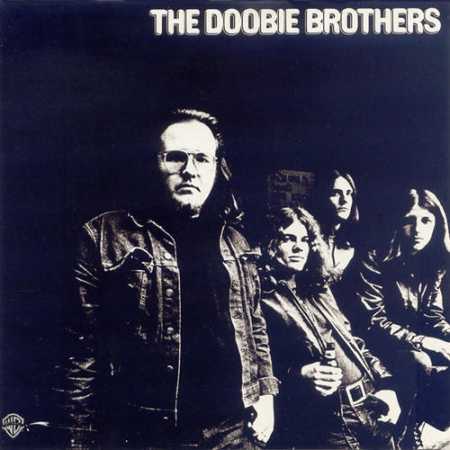 The Doobie Brothers is the first studio album by The Doobie Brothers, released in 1971. It is their only album to feature original bass player Dave Shogren who left before the recording of their second album.01 - Nobody02 - Slippery St. Paul03 - Greenwood Creek04 - It Won't Be Right05 - Travelin' Man06 - Feelin' Down Farther07 - The Master08 - Growin' A Little Each Day09 - Beehive State10 - Closer Every Day11 - ChicagoLINK
Views: 1533 |
Added by: Fremy0766 |
Date: 2010-06-19
|
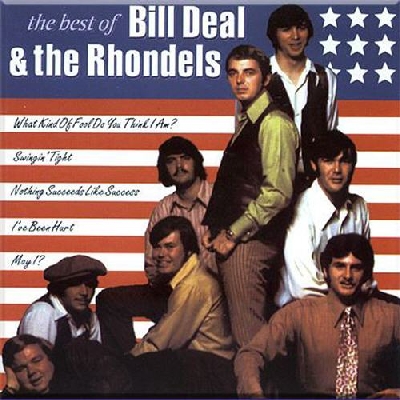
Bill Deal & the Rhondels were formed in 1965 in Virginia Beach, crossing blue-eyed soul, Beach music and Horn rock. They had 3 hits in 1969, I've Been Hurt (U.S. #35), What Kind Of Fool Do You Think I Am (U.S. #23) & May I (U.S. #39). Bill Deal - vocals, keyboards, Bob Fisher - saxophone, Gary Hardy - trumpet, Mike Kerwin - guitar, Jeff Pollard - trumpet, Ronny Rosenbaum - trombone, Ken Dawson - trumpet, Don Quisenberry - bass, Tom Pittman - saxophone, Ammon Tharp - drums, Rollie Ligart - trumpet. The band was active from 1965 to 2003. This comp is from 1994. 01 - I've Been Hurt02 - Nothing Succeeds Like Success03 - What Kind Of Fool Do You Think I Am04 - Swingin' Tight05 - May I06 - I'm Gonna Make You Love Me07 - Are You Ready For This08 - I've Got My Needs09 - Can I Change My Mind10 - Harlem Shuffle11 - Words12 - River Deep, Mountain High13 - Touch Me14 - Hooked On A Feeling15 - I've Gotta Be Me16 - Hey Bulldog17 - Soulful Strut18 - Tuck's Theme19 - It's Too Late20 - So What If It Rains21 - Everybody's Got Somethin' To Hide22 - I Live In The NightLINK
Views: 2234 |
Added by: Fremy0766 |
Date: 2010-06-19
|
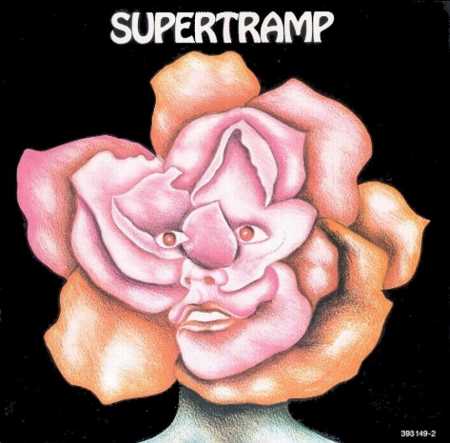 Supertramp are a British progressive rock band that released a series of top-selling albums in the 1970s and early 1980s. Their early music included ambitious concept albums, from which were drawn a number of hits including "Goodbye Stranger", "Bloody Well Right", "The Logical Song", "Breakfast in America", "Dreamer", "Give a Little Bit", "It's Raining Again", and "Take the Long Way Home". Supertramp attained superstardom in the United States, Canada, most of Europe, South Africa, Australia and Brazil, although they were not quite as popular in the UK. Supertramp is the self-titled debut album by the band, released in July 1970. It has sometimes been published under the title Now and Then. The album was critically acclaimed and reached #158 on the U.S. Billboard 200. It was not released in the United States until late 1977, but it was available in the US through importers and was usually carried in those record shops that specialized in British imports. Musically, it was more melancholy and progressive than any other Supertramp album.01 Surely02 It's A Long Road03 Aubade And I Am Not Like Other Birds Of Prey04 Words Unspoken05 Maybe I'm Beggar06 Home Again07 Nothing To Show08 Shadow Song09 Try Again10 SurelyLINK
Views: 1366 |
Added by: Fremy0766 |
Date: 2010-06-19
|
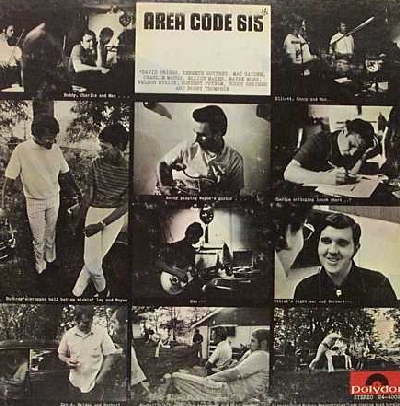 Area Code 615 was the name of a Nashville country rock band active in the late 1960s and early 1970s, taking their name from the telephone area code, which at the time covered all of Central and Eastern Tennessee. The band was made up of session musicians, recording only two albums before resuming normal session work. Several of the members were backing musicians for Bob Dylan's Blonde on Blonde and Nashville Skyline albums and on recordings by Billy Swan. Mac Gayden - Lead Guitar, Vocals, Charlie McCoy - Harmonica, Vocals, Bobby Thompson - Banjo, Guitar, Wayne Moss - Guitar, Bass, Buddy Spicher - Fiddle, Viola, Cello, David Briggs - Keyboards, Ken Lauber - Keyboards, Norbert Putnam - Bass, Cello, Kenny Buttrey - Drums, Weldon Myrick - Pedal Steel Guitar01 - Southern Comfort02 - I've Been Loving You Too Long03 - Hey Jude04 - Nashville 9, Ny 105 - Lady Madonna06 - Medley (Crazy Arms & Get Back)06 - Ruby07 - Why Ask Why08 - Lil' Maggie09 - Classical Gas10 - Just Like A WomanLINK
Views: 1760 |
Added by: Fremy0766 |
Date: 2010-06-19
|
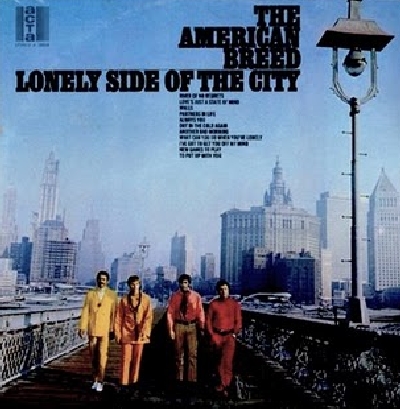
The American Breed was an American rock band that was formed in 1966 and disbanded in 1969. The group was formed in Cicero, Illinois as Gary & The Nite Lites. The group's greatest success was the single, "Bend Me, Shape Me," which reached number five on the U.S. Billboard Hot 100 chart in 1968. The song, written by Scott English and Larry Weiss, was a remake of a recording by The Outsiders that had been released the year before. The group also appeared on the 16 December 1967 episode of the television show American Bandstand, along with Pink Floyd. Lonely Side of the City is the fourth and final studio album by the group, released in the fall of 1968. For their last album, the group decided to move more towards a soft rock approach. However, the group had all but fallen out of favor with the music public, and the album failed miserably. "Walls" was the only single released from the album, and, after releasing several more non-album singles, including the last official American Breed single, "Can't Make It Without You" (1970), the group officially disbanded.01 - Always You02 - Love Is Just A State Of Mind03 - New Games To Play04 - Walls05 - I've Got To Get You Off My Mind06 - To Put Up With You07 - Another Bad Morning08 - What Can You Do When You're Lonely09 - River Of No Regrets10 - Partners In Life11 - Out In The Cold AgainLINK
Views: 1723 |
Added by: Fremy0766 |
Date: 2010-06-19
|
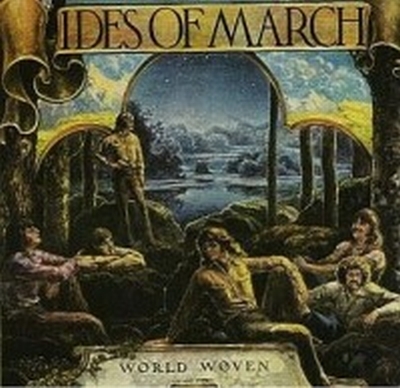 The Ides of March is an American rock band that had a major US and minor UK hit with the song "Vehicle" in 1970. After going on hiatus in 1973, the band returned with their original line-up in 1990 and has been active since then. The Ides of March began in Berwyn, Illinois (a western suburb of Chicago) on October 16, 1964, as "The Shon-Dels." Their first record, "Like It Or Lump It," was released on their own "Epitome" record label in 1965. In 1966, after changing their name to The Ides of March (a name suggested by bassist Bob Bergland after reading Shakespeare's Julius Caesar in high school), the band released their first single on Parrot Records - "You Wouldn’t Listen." The song reached #7 in Chicago, and #42 on the Billboard Hot 100 in spring 1966. This record and its follow-ups (all pre-"Vehicle") have been re-released on the Sundazed Records CD Ideology. By the end of the 1960s, the band added a brass section, although Bergland often doubled up on tenor saxophone.01 - Colorado Morrow02 - All Join Hands03 - Mellow Your Soul04 - Flip Side05 - Mother America06 - Diamond Fire07 - Landlady08 - Baby's Gonna Grow09 - ChildrenLINK
Views: 2436 |
Added by: Fremy0766 |
Date: 2010-06-19
|
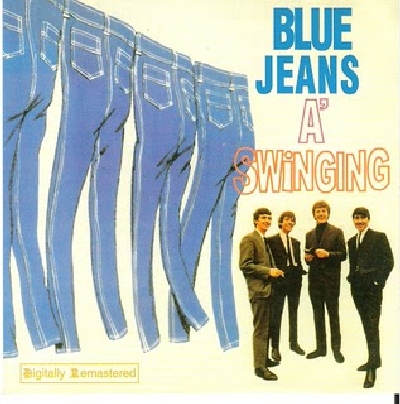 The Swinging Blue Jeans were a four piece 1960s British Merseybeat band, best known for their hit singles with the HMV label; "Hippy Hippy Shake", the follow up, Little Richard's "Good Golly Miss Molly", and "You're No Good", a Clint Ballard song that provided a change of pace and furnished the group's most enduring achievement. But subsequent singles released that year and the next made no impression. In 1966 their version of Burt Bacharach and Hal David's "Don't Make Me Over" peaked at #31 in the UK Singles Chart, but the group never charted again.01 - Ol' Man Mose02 - Save The Last Dance For Me03 - That's The Way It Is04 - Around And Around05 - It's All Over Now06 - Long Tall Sally07 - Lawdy Miss Clawdy08 - Some Sweet Day09 - It's So Right10 - Don't It Make You Feel Good11 - All I Want Is You12 - Tutti FruttiLINK
Views: 1794 |
Added by: Fremy0766 |
Date: 2010-06-19
|
 The Flying Machine was a British pop band, which was in 1969, renamed from Pinkerton's Assorted Colours. The Flying Machine is best known for its major hit single in 1969, "Smile A Little Smile For Me", which peaked at number 5 on the U.S. Billboard Hot 100 chart (on Kapp Records' Congress record label) Their first record which was self titled was released by Janus Records in 1969. By 12 December that year they had sold a million copies of the record, and it was awarded a gold disc by the R.I.A.A. Tony Newman - vocals, guitars, Steve Jones - guitars, vocals, Sam Kempe - vocals, Stuart Colman - bass, electric piano, Paul Wilkinson – drums, Edie Andrews - background vocals. The Flying Machine is the debut album.01 - Smile A Little Smile For Me02 - Marie Take A Chance03 - Waiting On The Shores Of Nowhere04 - That Same Old Feeling05 - There She Goes06 - Baby Make It Soon07 - Broken Hearted Me, Evil Hearted You08 - A Thing Called Love09 - My Baby's Coming Home10 - Send My Baby Home AgainLINK
Views: 2150 |
Added by: Fremy0766 |
Date: 2010-06-19
|
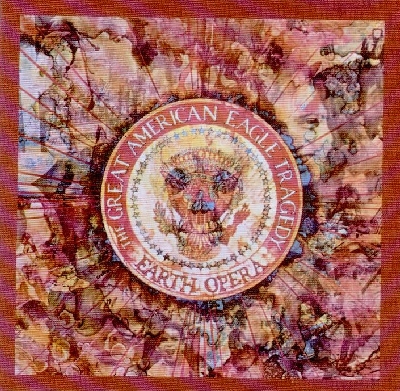 Earth Opera was an American psychedelic rock group, active during 1967-1969 and featuring Peter Rowan and David Grisman. Both Rowan and Grisman were virtuoso folk and bluegrass performers in Boston clubs, who became caught up in the changes in the music scene in the mid 1960s. They formed Earth Opera in 1967 in Boston, Massachusetts, and were joined by John Nagy on bass, Paul Dillon on drums, and Bill Stevenson on keyboards and vibraphone. Although the first album never charted, Elektra was willing to record a second LP, "The Great American Eagle Tragedy". By this time, Stevenson had left. The second album featured an array of eminent guests including John Cale (viola) and Bill Keith (pedal steel). "The Great American Eagle Tragedy” managed to reach the lower end of the national charts, the cover featuring a parody of the US presidential seal with a superimposed death skull and what looks like blood stains. However, the band’s relative lack of success caused Earth Opera to break up in 1969.01 - Home To You02 - Mad Lydia's Waltz03 - Alfie Finney04 - Sanctuary From The Law05 - All Winter Long06 - The Great American Eagle Tragedy07 - Roast Beef Love08 - It's LoveLINK
Views: 1410 |
Added by: Fremy0766 |
Date: 2010-06-19
|
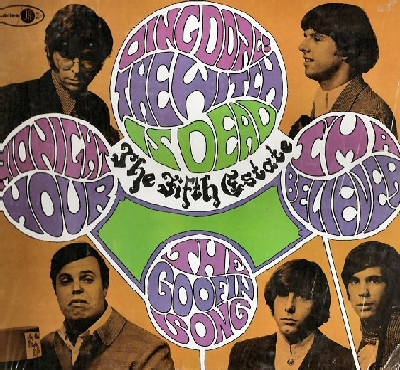 The Fifth Estate was a rock n roll band originally formed in Stamford, Connecticut as The D-Men in early 1964. At the start they played many small shows and local clubs, but they soon gravitated to Greenwich Village and larger clubs where they often played six nights a week for long stretches. They played a proto punk form then called Beat music, which later evolved into a rock/pop form and group The Fifth Estate that played around the USA through the 60s at large theaters and at the coliseum level. Early on as The D-Men they released three singles with considerable success, two on Veep/United Artists and one on the Kapp labels, which along with much of their later material has become collectors' items and established them as a central part of the Garage Rock movement. Boston Skyline released a 28-song collection of their music in 1993 and published a 41-page booklet of their story.01 - Birds & Bees02 - Ding Dong! The Witch Is Dead03 - Heigh-Ho04 - I'm A Believer05 - It's Waiting There For You06 - Kisses For Breakfast07 - Lost Generation08 - Midnight Hour09 - No. 1 Hippie On The Village Scene10 - Rub-A-Dub11 - That's Love12 - The Goofin' Song13 - Tomorrow Is My TurnLINK
Views: 1708 |
Added by: Fremy0766 |
Date: 2010-06-19
|
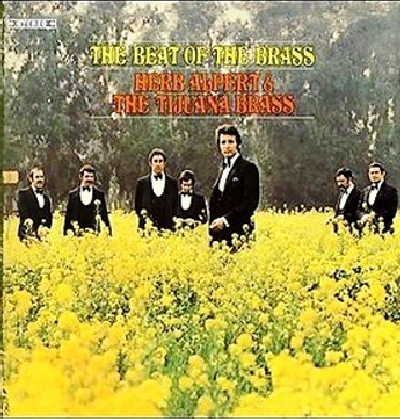 Herbert "Herb" Alpert is an American musician most associated with the group known as Herb Alpert & the Tijuana Brass. He is also a recording industry executive — he is the "A" of A&M Records (a recording label he and business partner Jerry Moss founded and eventually sold). Alpert's musical accomplishments include five number one hits, twenty-eight albums on the Billboard charts, eight Grammy Awards, fourteen Platinum albums and fifteen Gold albums. As of 1996, Alpert had sold 72 million albums worldwide. The Beat of the Brass was the tenth album release by Herb Alpert & the Tijuana Brass. The album was released on the heels of a television special by the same title (telecast April 22, 1968 over CBS). Tom Mankiewicz, who wrote the special, also provided liner notes for the album as well. It includes Alpert's only major vocal hit, "This Guy's In Love With You", which became an overnight success due to its inclusion during the special, in a sequence featuring Herb and his wife, Sharon.
01 - Monday Monday
02 - A Beautiful Friend
03 - Cabaret
04 - Panama
05 - Belz Mein Shtetele Belz
06 - Talk To The Animals
07 - Slick
08 - She Touched Me
09 - Thanks For The Memory
10 - The Robin
11 - This Guy's In Love With You
LINK
Views: 1435 |
Added by: Fremy0766 |
Date: 2010-06-19
|
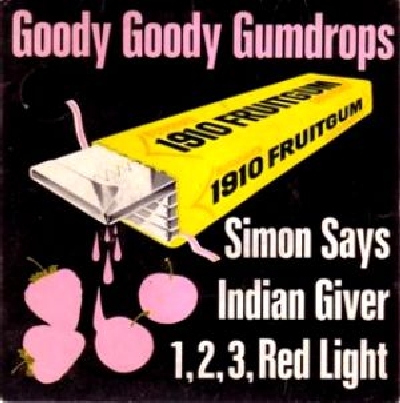 The 1910 Fruitgum Company is an American bubblegum pop band of the 1960s. The group's biggest hits included "Simon Says," "1, 2, 3, Red Light," "May I Take A Giant Step," "Special Delivery," "Goody Goody Gumdrops," and "Indian Giver." Guitarist Frank Jeckell claimed to have adopted the name from a candy wrapper that he found in his attic. Goody Goody Gumdrops EP is a compilation from 1968 with four greatest hits.01 - Goody Goody Gumdrops02 - Simon Says03 - Indian Giver04 - 1-2-3 Red LightLINK
Views: 1710 |
Added by: Fremy0766 |
Date: 2010-06-19
|
|
|
Statistics
Total online: 1 Guests: 1 Users: 0
|
















